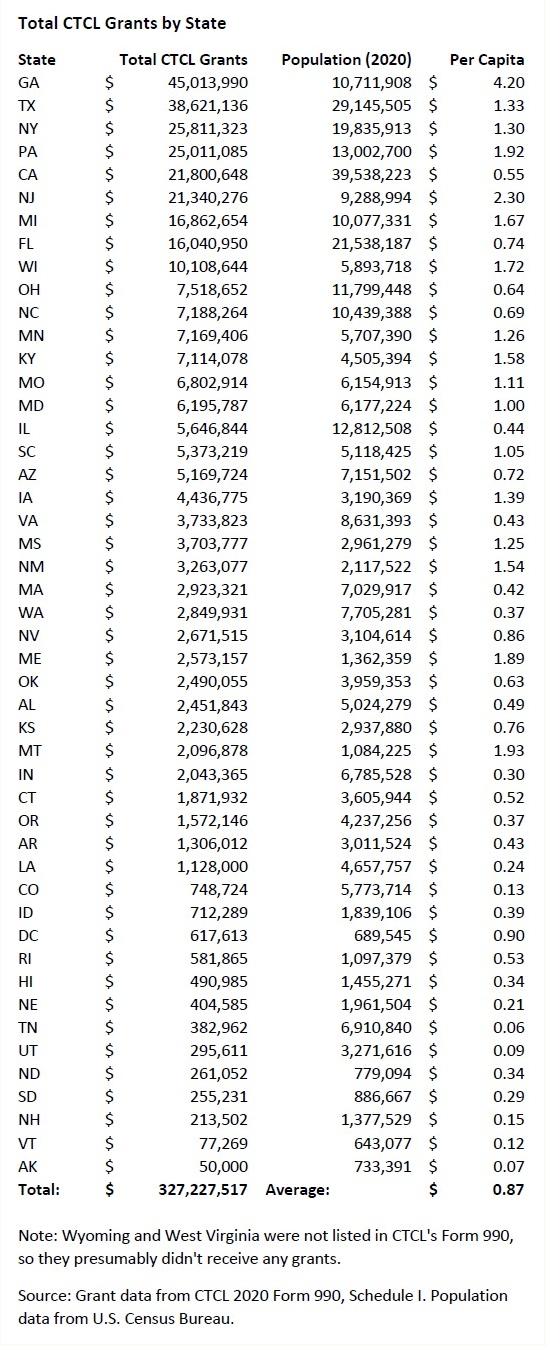On March 24, 2022, UncoverDC published an article on election integrity, and since that time, other notable legislation has been enacted. Specifically, a number of states have now passed laws prohibiting private funding in election administration. Some states enacted similar legislation in 2021, and others failed to see the process through. According to Capital Research:
"As of April 2022, 18 states have banned or restricted the use of private funds for election offices, and 6 governors—all Democrats—have vetoed potential bans. Wisconsin Gov. Tony Evers (D) has vetoed 2 Zuck buck bans; Kansas’s legislature overrode its Democratic governor’s veto. In addition, 1 county (Walworth, Wisconsin) has banned Zuck bucks."
Private/public partnerships—like the Center for Tech and Civic Life/Chan-Zuckerberg grant funding that provided for early voting, vote-by-mail, and dropboxes—may have tipped the scales in the 2020 General Election. States allow government/public funding of election administration, but the stipulations associated with those funds vary. According to Capital Research, grant monies for the states ranged from $0 in W. Virginia and Wyoming to $45,031,990 in Georgia.
 Capital Research/CTCL grants
Capital Research/CTCL grants
The states that have stepped up their game in 2022 in barring private funding for election administration are Alabama, Indiana, Kansas, Kentucky, Mississippi, Nebraska, South Dakota, Utah, and Virginia. Kansas, Gov. Laura Kelly (D) vetoed the legislation, but it was overridden. Pennsylvania introduced legislation in 2021, and Governor Wolf vetoed it. However, in December 2021, the state Senate introduced SB 982, which passed the Senate State Government Committee on April 12, 2022.
According to Capital Research, the states that passed laws prohibiting private funding of elections in 2021 were Florida, Arizona, Arkansas, Georgia, Idaho, North Dakota, Ohio, Tennessee, and Texas. Texas chose to regulate but not prohibit private funding with HB 2283. It "prohibits county officials accepting any donation larger than $1,000 unless it is approved "by written consent of the secretary of state, the joint elections, commission, county election commission, and county election board."
Other states failed either in committee, or the legislation died because a governor vetoed the legislation. Their governors have vetoed Lousiana, Michigan, North Carolina, and Wisconsin laws. Missouri, Montana, and Wyoming have failed to pass the bans on private funding for elections. South Carolina, with its HB 3877, was introduced in committee on June 21, 2021, but has not advanced since.
Criminal and Civil Enforcement of Elections
Some states have passed laws to strengthen or amend their enforcement of election crimes since our March 24 column. Georgia, Florida, W. Virginia, Alabama, and Kentucky have enacted varying levels of enforcement. Arizona made significant changes to its citizenship and residency requirements.
Election crimes seem to go consistently unenforced in the U.S., possibly emboldening criminals to operate with impunity again and again. Concerning election integrity efforts following the 2020 election, few states have pursued serious election fraud claims with legislation. Arizona's forensic audit has yet to yield prosecutions, despite a recent interim report confirming "serious vulnerabilities in the 2020 election" from Attorney General Mark Brnovich. In Wisconsin, the champion of election integrity has been Justice Michael Gableman, who has presented evidence indicating the infiltration of money and operatives associated with the Chan-Zuckerberg grants in 5 key cities. Claims of election fraud in Michigan were eventually thrown out despite months in court presenting strong evidence from attorney Matt DePerno.
Often it is individuals, private entities, and nonprofits that investigate election fraud. True the Vote and OPSEC have been running a data-heavy ballot trafficking investigation using geolocation technology to harvest cellphone data from apps for over a year in 5 states; Georgia, Wisconsin, Pennsylvania, Michigan, and Arizona. Garland Favorito, with VoterGA, has been a fixture now in Georgia with his nonpartisan election integrity efforts. He stood in court on May 4 to appeal his Fulton County counterfeit ballot lawsuit, Favorito et al. v. Wan et al., which was dismissed on October 13, 2021. On Tuesday, VoterGA pushed out a press release alleging that "the [Dominion Voting Systems] Democracy Suite 5.5 Ballot Marking Device (BMD) touchscreens failed to display language for the 9 th Republican question out of 13 on the DeKalb County Republican ballot." Matt Braynard with Look Ahead America says that Pennsylvania's election should never have been certified.


